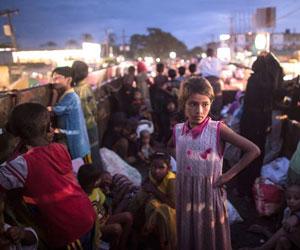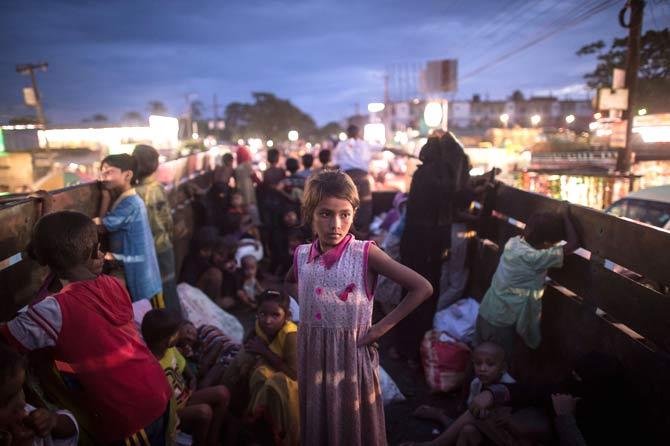Rape is being used as a weapon of war in the Rohingya crisis, with no woman safe from the risk of sexual attack as Myanmar's Muslim minority is driven out of its homeland

Rape is being used as a weapon of war in the Rohingya crisis, with no woman safe from the risk of sexual attack as Myanmar's Muslim minority is driven out of its homeland, according to experts in the field and those caught up in the crisis. Doctors treating some of the hundreds of thousands of Rohingya Muslims who have fled to Bangladesh from Myanmar in recent weeks have seen dozens of women with injuries consistent with violent sexual attacks, according to U.N. clinicians.

Rohingya Muslim refugees are evacuated in a truck to a refugee camps after crossing the Naf River, in Teknaf, Bangladesh's Ukhia district. File pic/AFP
And women interviewed by the Thomson Reuters Foundation tell of violent rape by Myanmar security forces as they flee their homes, part of a mass Rohingya exodus. "The Burmese (Myanmar) military has clearly used rape as one of a range of horrific methods of ethnic cleansing against the Rohingya," said Skye Wheeler, a sexual violence expert with Human Rights Watch who has assessed the fast-filling camps.
"Rape and other forms of sexual violence has been widespread and systematic as well as brutal, humiliating and traumatic," she told the Thomson Reuters Foundation. Myanmar dismisses all such accusations of ethnic cleansing, saying it has to tackle insurgents, whom it accuses of starting fires and attacking civilians, as well as the security forces.
Yet villagers fleeing the violence say rape is a routine weapon in the military's armoury, with the United Nations now deliberating whether the violence amounts to genocide.
Gangrape
Whatever the legal definition, 18-year-old Nurshida knows only too well what happened to her. Speaking to Thomson Reuters Foundation from the relative
safety of her camp, Nurshida recalled how her class of 30 was marched in silence to their school last month, held at gunpoint by uniformed soldiers, then manhandled into the main auditorium. The schoolgirls, she said, cowered as one in a corner; the men - breathing heavily and dripping sweat - occupied another.
The gang rape began immediately. Fair-skinned Nurshida, with bangles looping her wrist and a loose scarf shrouding her hair, said she was chosen first by the group, six clean-shaven soldiers carrying guns and machetes. "One of the men held me tightly on the floor. I started screaming, but a second soldier hit me in the face with his hand and undressed me fully. I was silent when they raped me, there was nothing I could do," Nurshida said. Her two friends were thrown to the floor next. As they were raped, smoke was rising in the distance as her native Naisapru village was on fire, one of many set alight in the exodus.
"All of the schoolgirls were raped and there were loud screams everywhere," said Nurshida, sitting in a mud hut in Bangladesh's Kutupalong camp where she is waiting to register as a refugee. Authorities say her story fits a horribly familiar pattern. "The stories we hear point to rape being used strategically
as a weapon of war," aid Rashed Hasan, a lieutenant colonel in the Bangladesh army.
Women of all ages and backgrounds have reported similarly brutal sexual assaults - as well as witnessing family killings, losing children and being forced from their homes. "Rape is an act of power. It knows no discrimination in terms of age, sex or ethnicity," Saba Zariv of the United Nations Population Fund told the Thomson Reuters Foundation.
Pregnant, raped, abandoned
At nine months pregnant, Jannet says she was brutally tortured and raped at her home in Myanmar. "My husband was killed five days before soldiers attacked our village. Our three children have never been seen again since," she said, cradling five-day-old Fatima in the flimsy makeshift tent she now calls home. Fatima, who was delivered in a rice field, is her only remaining family member. Late into her pregnancy, Jannet said she was alone when the army marched into Fakira Bazaar village. While everyone scattered into the jungle, the 22-year-old chose to hide.
"Several soldiers broke the door. They saw that I was pregnant, but they all raped me." At the end of the day she was left naked, beaten, her children gone.
"I cried and screamed for them, but I still don’t know where they are," she said. "I never want to go back to Myanmar ... I have lost everything." Yet safety is not guaranteed in the chaotic Rohingya refugee camps that are quickly becoming the world's largest. Parvin, 20, said she has been rejected by her in-laws after soldiers beheaded her husband and raped her while she was five months pregnant.
"They beat me unconscious," she said. "I woke up to an empty village and my in-laws searching for me. I was lying naked on the floor of their house." The last thing Parvin's mother-in-law did for her was help her wash after the rape. "They told me they didn't want to take responsibility for me and rejected me." Now she lives alone in a bamboo house, terrified of men. "I can never get married again now that I was raped. I have no choice but to raise my baby alone," she said. "That's all that drives me now. I have lost all else."
 Subscribe today by clicking the link and stay updated with the latest news!" Click here!
Subscribe today by clicking the link and stay updated with the latest news!" Click here!







